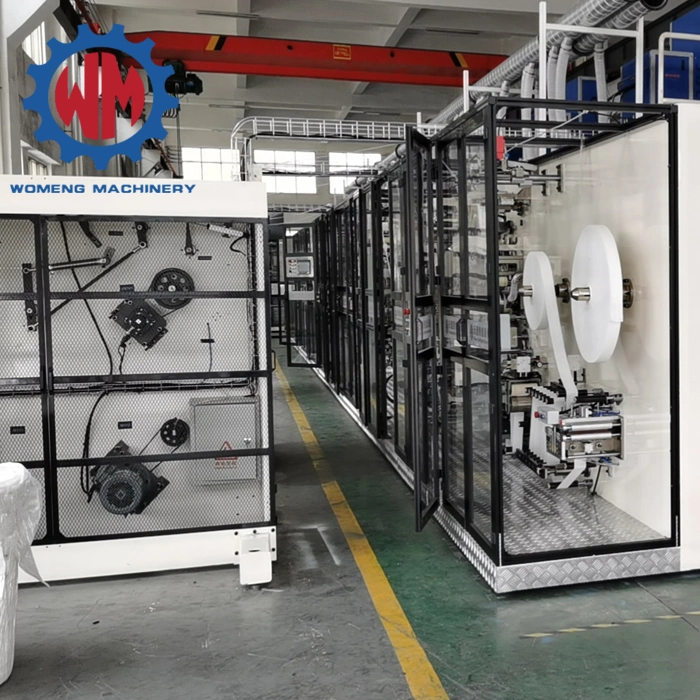Designing a full servo sanitary napkin machine for eco-friendly or sustainable production involves integrating various considerations to minimize environmental impact and enhance sustainability.
Here are key considerations in this design process:
- Energy Efficiency: Utilizing servo motors and energy-efficient components to reduce overall energy consumption during production. Optimizing machine settings and operations for minimal energy usage without compromising productivity.
- Material Selection: Choosing eco-friendly and sustainable materials for sanitary napkin production, such as biodegradable or compostable absorbent cores and packaging materials. Avoiding harmful chemicals or materials that may harm the environment.
- Waste Reduction: Designing the machine to minimize material waste during production. Implementing precise cutting mechanisms, efficient material handling systems, and optimization of material usage to reduce scrap and waste.
- Water Conservation: Implementing water-saving measures in machine operations and cleaning processes. Using water-efficient components and systems where possible.
- Recyclability and Biodegradability: Designing the machine to produce sanitary napkins that are easily recyclable or biodegradable after use. Considering materials and designs that promote environmental friendliness in disposal.
- Efficient Production Processes: Optimizing the production process for reduced resource consumption and environmental impact. Minimizing the use of chemicals, water, and energy-intensive processes without compromising product quality.
- Emissions Reduction: Employing technologies that reduce emissions and air pollution during production. Using cleaner energy sources or incorporating emission control systems where feasible.
- Lifecycle Assessment: Conducting a lifecycle assessment of the machine and the sanitary napkins it produces to evaluate environmental impact from raw material extraction to end-of-life disposal. This assessment helps identify areas for improvement.
- Compliance with Environmental Standards: Ensuring that the machine and the produced sanitary napkins comply with relevant environmental regulations and standards for sustainability and eco-friendliness.
- Continuous Improvement: Implementing a culture of continuous improvement to regularly assess and enhance the machine’s design and operations for better sustainability outcomes.
By incorporating these considerations into the design and operation of a full servo sanitary napkin machine, manufacturers can contribute to more eco-friendly and sustainable production processes, reducing environmental impact and promoting responsible manufacturing practices in the hygiene products industry.
What are the implications of digitization and IoT (Internet of Things) in the context of full servo sanitary napkin machine ?
Digitization and the Internet of Things (IoT) offer significant implications and advantages in the context of full servo sanitary napkin machines:
- Remote Monitoring and Control: IoT-enabled sensors and devices in the machine allow for real-time monitoring of production parameters, machine performance, and quality metrics. This enables operators or engineers to monitor and control the machine remotely, optimizing operations and addressing issues promptly from anywhere.
- Predictive Maintenance: IoT sensors collect data on machine health and performance. Analyzing this data helps predict potential maintenance needs or machine failures. Predictive maintenance schedules can be established, reducing downtime and preventing costly breakdowns.
- Data-Driven Insights: Digitization enables the collection and analysis of vast amounts of data generated during production. These insights provide valuable information on production trends, efficiencies, and areas for improvement, aiding in decision-making and process optimization.
- Efficiency and Optimization: IoT-connected systems allow for the optimization of machine settings and operations based on real-time data. This enhances production efficiency, full servo sanitary napkin machine suppiler minimizes resource wastage, and improves overall product quality.
- Quality Control and Defect Detection: IoT-enabled sensors and vision systems continuously monitor product quality. Any deviations from set standards trigger immediate corrective actions, ensuring consistent quality and reducing waste.
- Supply Chain Integration: IoT facilitates connectivity across the supply chain. It enables seamless communication between machines, suppliers, and manufacturers, optimizing inventory management, and ensuring timely availability of raw materials.
- Energy Efficiency: IoT-enabled devices can monitor energy consumption patterns within the machine. This data helps in identifying opportunities for energy savings and optimizing energy usage for improved sustainability.
- Adaptability and Flexibility: IoT-connected machines can adapt to changing production requirements more easily. They can be reprogrammed or adjusted remotely to accommodate variations in product specifications or market demands.
- Traceability and Compliance: Digitization allows for detailed tracking and traceability of production processes. It aids in meeting regulatory compliance requirements and maintaining comprehensive records for audits or certifications.
- Integration with ERP Systems: IoT-connected machines can integrate with Enterprise Resource Planning (ERP) systems. This integration streamlines data flow, facilitates efficient resource allocation, and supports better decision-making across the organization.
Overall, digitization and IoT technologies offer substantial benefits in enhancing operational efficiency, quality control, predictive maintenance, and adaptability in full servo sanitary napkin machines, leading to improved productivity, reduced costs, and better sustainability in manufacturing processes.
